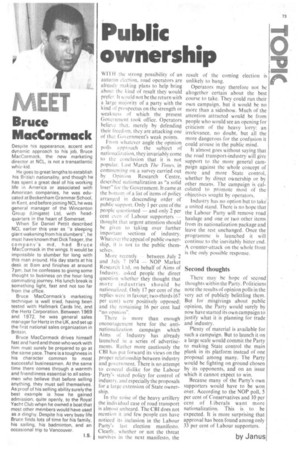Public ownership
Page 79

If you've noticed an error in this article please click here to report it so we can fix it.
WITH the strong possibility of an autumn election, road operators are already making plans to help bring about the kind of result they would prefer. It would not be the return with a large majority of a party with the kind of prospectus on the strength or weakness of which the present Government took office. Operators believe that, merely by defending their freedom. they are attacking one of that Government's weak points.
From whatever angle the opinion polls approach the subject of nationalization, they invariably come to the conclusion that it is not popular. Last March The Times, in commenting on a survey carried out by Opinion Research Centre, described nationalization as "a solid loser" for the Government. It came at the bottom of a list of items of policy arranged in descending order of public support. Only 1 per cent of the people questioned — and only 2 per cent even of Labour supporters — thought that urgent attention should be given to taking over further important sections of industry. Whatever the appeal of public ownership, it is not to the public themselves.
More recently between July 2 and July 7 1974 — NOP Market Research. Ltd, on behalf of Aims of Industry, asked people the direct question whether they thought that more industries should be nationalized. Only 17 per cent of the replies were in favour; two-thirds .(67 per cent) were positively opposed; and the remaining 16 per cent had "no opinion".
There is more than enough encouragement here for the antinationalization campaign which Aims of Industry has already launched in a series of advertisements. Rather more cautiously the CBI has put forward its views on the proper relationship between industry and government. There is no attempt to conceal dislike for the Labour Party's stated policy for control of industry, and especially the proposals for a large extension of State ownership.
In the noise of the heavy artillery the individual case of road transport is almost unheard. The CBI does not mention it and few people can have noticed its inclusion in the Labour Party's last election manifesto. Clearly, whether or not the threat survives in the next manifesto, the result of the coming election is unlikely to hang.
Operators may therefore not be altogether certain about the best course to take. They could run their own campaign, but it would be no more than a sideshow. Much of the attention attracted would be from people who would see an opening for criticism of the heavy lorry: an irrelevance, no doubt, but all the more dangerous for the confusion it could arouse in the public mind.
It almost goes without saying that the road transport-industry will give support to the more geneal campaign against the whole concept of more and more State control, whether by direct oWnership or by other means. The campaign is calculated to promote most of the objectives sought by operators.
Industry has no option but to take' a united sta.nd. There is no hope that the Labour Party will remove road haulage and one or two other items from its nationalization package and leave the rest unchanged. Once the programme is launched it will continue to the inevitably bitter end. A counter-attack on the whole front is the only possible response.
Second thoughts
There may be hope of second thoughts within the Party. Politicians note the results of opinion polls in the very act of publicly belittling them. But for .misgivings about public opinion, the Party would surely by now have started its own campaign to justify what it is planning for trade and industry.
Plenty of material is available for such a campaign. But to launch it on a large scale would commit the Party to making State control the main plank in its platform instead of one proposal among many. The Party would be fighting on ground chosen by its opponents, and on an issue which it cannot expect to win.
Because many of the Party's own supporters would have to be won over. According to the NOP poll, 5 per cent of Conservatives and 10 per cent of I.iberals Want more nationalization. This is to be expected. It is more surprising that approval has been found among only 33 per cent of Labour supporters.
by Janus
































































































































